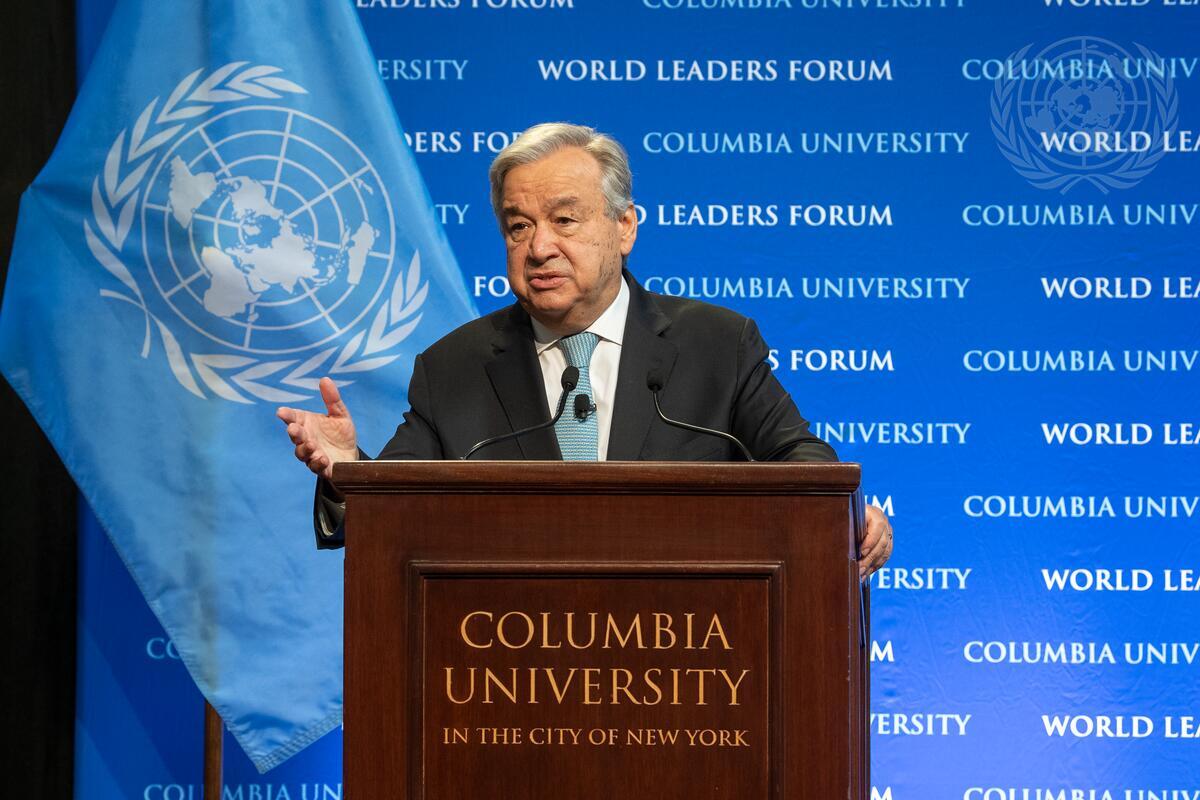Written by: Manuel Planelles
2020 was to be the turning point in the international fight against climate change. But the pandemic forced the climate summit to be held in Glasgow (United Kingdom) to be postponed for a year. And the commitments of greater ambition against warming that the countries were going to present at that meeting have remained in the air. António Guterres (Lisbon, 1949), UN Secretary-General, now sets 2021 on the calendar as the year in which “a global coalition” must be formed to achieve carbon neutrality by 2050 – that is, the amount of carbon dioxide carbon that human activities will emit by mid-century is equal to that absorbed by sinks, such as forests. This is the way to ensure that the average increase in the planet’s temperature does not exceed 1.5 ºC compared to pre-industrial levels, the most ambitious objective of the Paris Agreement. December 12 marks the fifth anniversary of the signing of that pact in the French capital and the UN has promoted a virtual summit to commemorate it and try to relaunch the fight against global warming. “There are so many areas in which we must change course if we want a planet where we can live,” says Guterres from New York in this interview conducted by videoconference within the Covering Climate Now project, an international media consortium created to promote information on climate change.
Question. Are we in a climate emergency?
Answer. Yes, we are in a climate emergency, we are not only in the middle of the covid pandemic crisis. We see that we are in an emergency when we look at what happens with the increase in the presence of greenhouse gases in the atmosphere or the increase in temperatures – this year is one of the three hottest on record. Also, if we look at what happens with glaciers, if we look at what happens with Greenland or Antarctica, if we look at what happens with sea level , if we look at what happens with hurricanes and other storms in different parts of the world. , if we look at that nine million people die every year from air pollution and the water caused by the same factors that create the climate crisis… We are facing a climate emergency. But it is not an emergency for a year or two, it will be the essential challenge of this century. This emergency forces us to mobilize to combat it. It is very important to us that 2021 is the year of the creation of a global coalition for carbon neutrality. Europe has already committed to achieving a zero carbon footprint by 2050 and we also have Japan and South Korea. The new US Administration has announced it and China has promised carbon neutrality by 2060… But now we need a global coalition and we want each company, each city, each bank and each country to propose their transition plan for carbon neutrality. We want measures to be taken so that by the end of 2021 each country raises the national determined contributions [the emission cut plans for this decade, known by its acronym in English NDC] in line with the objective of the Paris Agreement, in line with the goal of leaving the temperature rise at 1.5 degrees at the end of the century.
Q. Are you afraid that the economic crisis derived from the pandemic could slow down the fight against climate change in the world?
A. I think you have to do the exact opposite. Unfortunately, we are seeing today that the G-20 countries in the recovery measures of their economies are investing 50 percent more in activities related to fossil fuels than in renewable energies and in the green economy. This is unacceptable, because the billions of dollars and euros that are being spent for the recovery and maintenance of economies are loans that will be inherited by future generations. It is not acceptable that future generations receive a lot of debt and that debt has been used to destroy the planet. It is clear that there is a moral responsibility. What we are spending to recover from the covid must at the same time have inclusion as a clear priority, combating inequalities, and sustainability, fighting climate change . If we don’t, we will be committing a serious crime in our relationship with our children and grandchildren.
“It is not acceptable that future generations receive a lot of debt and that debt has been used to destroy the planet”
Q. More than 100 countries have so far announced commitments to achieve carbon neutrality by 2050, but almost none have submitted their new plans for 2030, the NDCs. Are you afraid that promises for 2050 will be used as an excuse for not updating short-term plans?
A. No, no. You have to do both. The central objective of the UN for 2021 is to constitute a global coalition for carbon neutrality. And a coalition in which all the G-20 states are in and that guarantees that the 1.5-degree objective is achieved. But that’s only the first part of our goal. The second is to ensure that all States propose between now and the end of 2021, between now and the Glasgow summit, COP26, NDC that guarantee an average reduction in emissions of 45 percent until the end of the decade; the target for Europe should be 55 percent. At the same time, concrete measures must be put in place to reach carbon neutrality by 2050. And that has practical consequences: we must end fossil fuel subsidies; No more coal power plants should be built in the world and there should be a gradual abandonment of the plants in operation; taxation must be changed; International financial institutions and development banks must be urged to make commitments to mobilize private funds on climate change for developing countries.
Q. Until the arrival of the pandemic, 2020 was called to be precisely the key year for everything you say. Can the world afford to lose another year?
A. No. That is why 2021 is the year of truth in terms of climate change, but also in terms of biodiversity, because we have the Kunming (China) meeting. We are killing a million species in the world. It is unacceptable. Especially when we know today that 70 percent of communicable diseases are of zoonotic origin. What we are doing to nature is endangering our health. It has to be the year of the oceans, to end the overexploitation of fishing, increase protected areas, guarantee a drastic reduction in chemical and plastic pollution, which have an absolutely devastating impact on the oceans and our health with microplastics that penetrate on all sides. 2021 has to be the year of reconciliation with nature. We are at war with nature and it is a suicidal war because nature always responds and does so with increasing violence. We must make peace between humanity and nature and 2021 is the year of truth to do so. Climate change, biodiversity, oceans and aspects related to forests, land degradation… There are so many areas in which we must change course if we want a planet where we can live.
“We want each company, each city, each bank and each country to propose their transition plan for carbon neutrality”
Q. The IPCC, the scientists who advise the UN, published its first report 30 years ago and it already indicated the clear relationship between climate change and greenhouse gases. But since 1990 the emission of these gases has increased by more than 60 percent. Why do governments ignore science?
A. I think that we are only now seeing a global mobilization of civil society, and of youth especially, with extraordinary leadership. But also from the private sector. Today we see that the private sector is often going ahead of governments and understanding that if their activities are not sustainable, they have no future. And so there is increasing pressure from civil society, the private sector and the youth on governments. And unfortunately we know that governments normally only act when they are pressured. This pressure is growing and gaining an enormous dimension. I am very optimistic about the growing consciousness of humanity and the governments have no alternative but to correspond with a concrete action in line with what the scientific community asks of us.
Q. The European Union is now debating its new target for 2030, its NDC, but there are problems with some countries . Why is it important for the EU to present its new target on 12 December?
A. Europe’s leadership is essential today. Fortunately, Europe was the first big economy, because many small economies did it before, which adopted the commitment to a zero carbon footprint by 2050. Then we had Japan, South Korea, China with a horizon before 2060, now we have the new US Administration… Europe’s leadership is clear. And now it is equally important to translate that 2050 goal into concrete and immediate action. For this, the European commitment to reduce its emissions by 55 percent by 2030 is essential. It is a commitment to the responsibility of a continent that has contributed a lot to climate change but that today is ready to assume leadership in this fight. Europe has a historical destiny here and it has to correspond to that historical destiny.
Q. You maintain that Europe should have an emission reduction target of 55 percent in 2030. What target should the new US Administration set itself?
A. The new Administration has already announced the commitment to carbon neutrality in 2050 . I hope that this commitment will be transformed first in the re-entry into the Paris Agreement and second in the presentation of an NDC in line with the goal of neutrality to 2050. I have great hope. The statements made by the new coordinator responsible for climate action, John Kerry , are very important and send a very clear signal: the US wants to resume a leadership that it already had in climate action.
“The US wants to resume a leadership it already had in climate action”
Q. But the US, the largest historical emitter of greenhouse gases, has moved in recent years in the opposite direction. How has this stance affected climate action?
A. It is important to recognize that in American society, in cities, in various states and in companies there has been significant progress. For example, the level of emissions in the United States has even been reduced during the last four years. It is still high, but it has been lowered. I believe that with a strong [federal] government now American society will be able to respond. Because without the US it will be impossible to achieve our goals of limiting temperature growth by the end of the century by 1.5 degrees Celsius.
Q. Have you already contacted President-elect Joe Biden or John Kerry?
A. Of course, those contacts are taking place. And of course we are fully available to any incoming Administration to ensure we fully support the net zero emissions targets in 2050.
Q. The other great actor would remain: China. Is it enough for you to commit to carbon neutrality in 2060 or do you need to get there sooner?
A. China has stated that it will achieve carbon neutrality by 2060 . And what we ask is that it be as soon as possible. It must be understood that the Chinese economy is an economy with a different level of development from that of the European and North American economies. And the principle of the Paris Agreement is one of common but differentiated responsibilities. But it is essential that China, like India and other countries that are now large emitters, assume a co-responsibility with carbon neutrality and that this is done in a way that allows us to reach 2050 globally with that neutrality objective.
Header Image Credit: UN Photo/Eskinder Debebe

This interview originally appeared in El País and is republished here as part of Covering Climate Now, a global journalism collaboration strengthening coverage of the climate story.







